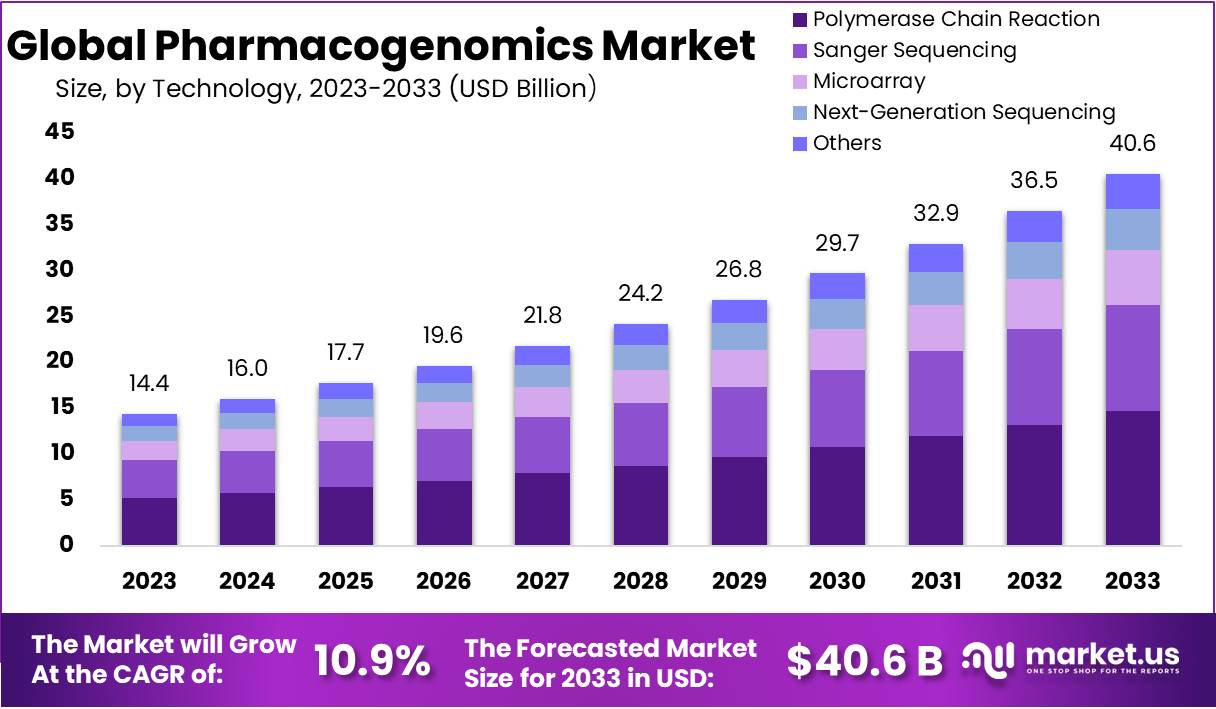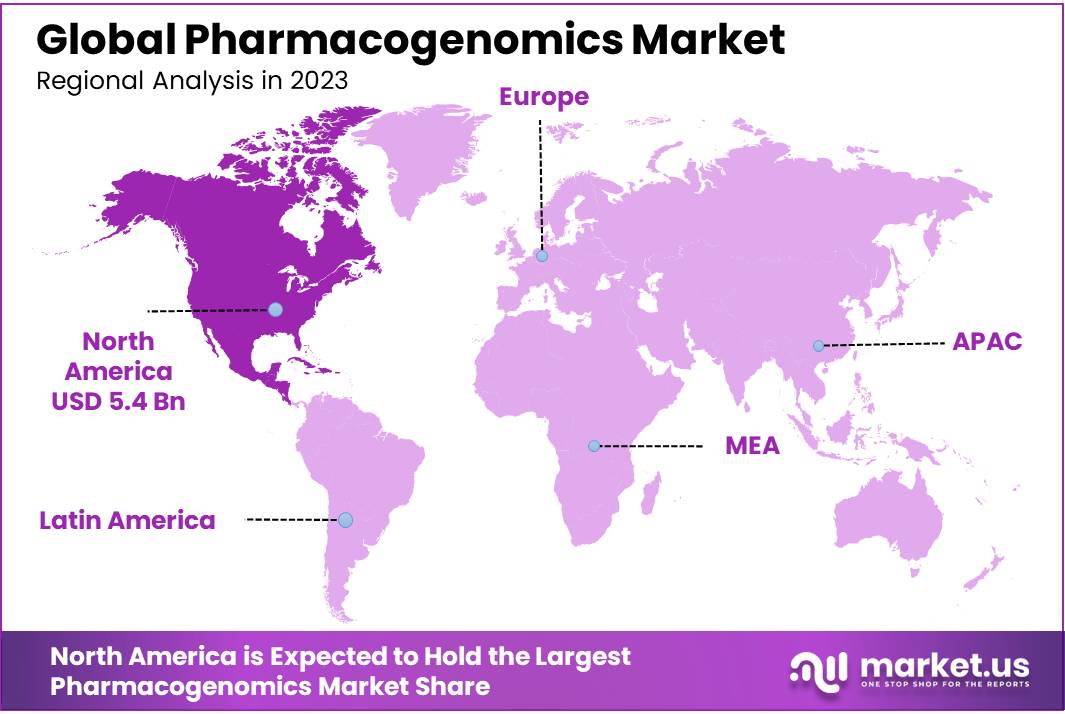Pharmacogenomics Market Demand to Hit USD 40.6 Billion by 2033 | Globally at 10.9% CAGR

The rapid evolution of genomic technologies, such as next-generation sequencing (NGS) and high-throughput genotyping, has significantly enhanced our ability to analyze genetic variations. This technological progress enables more precise and efficient pharmacogenomic testing, driving market growth.
New York, Feb. 19, 2024 (GLOBE NEWSWIRE) — According to Market.us, the global Pharmacogenomics market size is forecasted to exceed USD 40.6 Billion by 2033, with a promising CAGR of 10.9% from 2024 to 2033.
Pharmacogenomics is an interdisciplinary field that examines how an individual’s genetic makeup influences their response to drugs, encompassing factors like efficacy, safety, and adverse reactions. By integrating pharmacology and genomics, pharmacogenomics seeks to tailor treatments based on genetic information, aiming to identify genetic variations that affect drug metabolism and response, including absorption, distribution, metabolism, and excretion processes. This variability in drug outcomes and reactions among individuals underscores the importance of personalized medicine approaches.
Pharmacogenomics technology utilizes genetic data to customize drug treatments according to individual responses, investigating genetic differences that impact drug effects and facilitating personalized therapies. This field spans drug development, clinical guidance, and consumer testing, employing techniques such as microarrays and advanced sequencing to identify relevant genetic traits. Key stakeholders in pharmacogenomics include medical facilities, pharmaceutical companies, and research centers. Market expansion in pharmacogenomics is influenced by regulatory landscapes, prevalent disease areas, and regional acceptance of personalized medicine approaches.
Request Sample Report and Drive Impactful Decisions: https://market.us/report/pharmacogenomics-market/request-sample/
Key Takeaway:
- In the pharmacogenomics market, the technology segment is characterized by the dominance of polymerase chain reaction (PCR), holding a majority share of 36.2%, driven by significant technological advancements facilitating the development of safe and efficient medications aligned with individuals’ genetic composition. Sanger sequencing technology is expected to witness substantial growth during the forecast period, particularly in variant identification testing in pharmacogenomics clinical studies.
- The oncology segment leads in applications, capturing 29.1% of the market share, attributed to the rising global incidence of cancer, demand for personalized therapies, and increased utilization of pharmacogenomics in drug research and development. Infectious diseases show rapid expansion due to the integration of pharmacogenomics to combat such diseases effectively.
- Among end-users, hospitals and clinics dominate with a 39.5% market share, leveraging advanced labs and specialized pharmacogenomics units, while research institutes are growing fast, employing pharmacogenomics to develop personalized treatments for diseases like cancer and infectious diseases such as tuberculosis and HIV/AIDS.
- Region wise, North America dominated the market by claiming a market share of 37.6%.
Factors Affecting the Growth of the Pharmacogenomics Market:
- The market is influenced by several driving factors, including the increasing prevalence of chronic conditions like gastrointestinal disorders and cancer, which propel the demand for advanced technologies and drug therapies.
- However, the high costs associated with research and development, limited awareness in less developed economies, and disruptions caused by the recent pandemic pose significant restraints to market growth.
- Emerging opportunities in pharmacogenomics, particularly in personalized medicine, offer promising prospects for customized treatments based on genetic profiles, which can enhance efficacy and reduce adverse reactions.
- Healthcare companies are increasingly investing in pharmacogenomics solutions, driven by the potential long-term cost reductions and benefits of personalized medicine, thus contributing to the growth of the pharmacogenomics market.
Top Trends in the Global Pharmacogenomics Market:
- One of the latest trends in the healthcare industry is the increasing focus on investments in pharmacogenomics solutions. Despite the initial high cost of pharmacogenomics testing, healthcare companies recognize the long-term benefits, which can lead to significant cost reductions. By avoiding hazardous or ineffective medications and optimizing treatments based on genetic profiles, healthcare systems can minimize emergency room visits, unnecessary diagnostic tests, and hospital admissions.
- Furthermore, personalized medicine offers a solution to the financial strain caused by ineffective therapies and adverse drug reactions. As awareness grows regarding the potential economic advantages of personalized medical approaches, healthcare companies are directing more investments toward pharmacogenomics solutions. This trend reflects a shift toward more targeted and efficient healthcare practices, which is expected to drive the growth of the pharmacogenomics market in the foreseeable future.
Market Growth:
The pharmacogenomics market is experiencing robust growth driven by increasing investments from key players and governments to enhance drug safety and effectiveness. Intense competition among prominent companies in the field fuels innovation and the introduction of advanced pharmacogenomic technologies. Government support, particularly in funding companies engaged in bioinformatics technology for precision medicine research, further accelerates market expansion.
Additionally, the launch of innovative products and services tailored to pharmacogenomics contributes to market growth. These factors collectively underscore the market’s dynamic nature and its trajectory toward continued expansion, as personalized medicine approaches gain prominence and genetic information becomes increasingly integrated into drug development and treatment strategies.
Macroeconomic Factors:
Several macroeconomic factors influence the pharmacogenomics market’s dynamics. Economic indicators such as GDP growth, disposable income levels, and healthcare spending directly impact consumer affordability and demand for pharmacogenomic testing and personalized medicine. Regulatory frameworks and policies governing healthcare, drug approvals, and intellectual property rights also significantly shape market dynamics.
Moreover, demographic trends, including aging populations and increasing prevalence of chronic diseases, drive the adoption of pharmacogenomic solutions. Additionally, global trends in healthcare infrastructure development, technological advancements, and shifts in healthcare delivery models influence market growth and adoption rates. Overall, the interplay of these macroeconomic factors shapes the landscape of the pharmacogenomics market, impacting investment patterns, innovation, and market expansion.
Regional Analysis:
North America emerged as the dominant region in the pharmacogenomics market, capturing the majority share of 37.6%. This leadership position is attributed to several factors, including increasing research and development investments, frequent launches of novel products, and the expansion of the pharmaceutical industry within the region. Furthermore, North America benefits from the presence of numerous major industry players, a robust healthcare infrastructure, rising awareness about early medical condition diagnosis for improved treatment outcomes, and favorable reimbursement policies, all of which are expected to drive market growth in the region.
Meanwhile, the Asia-Pacific region is anticipated to experience the fastest growth rate during the forecast period, fueled by the rising prevalence of gastrointestinal disorders and increasing healthcare initiatives by governments. Moreover, Europe is expected to demonstrate significant growth with a notable compound annual growth rate (CAGR) over the forecast period. This growth is driven by the growing incidence of chronic illnesses, which has led to increased demand for precision medicine within the region. Collectively, these regional dynamics underscore the diverse opportunities and growth prospects within the global pharmacogenomics market.
Explore the strategic advantages our report holds for your business. Request a brochure to find out more https://market.us/report/pharmacogenomics-market/#inquiry

Scope of the Report
| Report Attributes | Details |
| Market Value (2023) | USD 14.4 Billion |
| Forecast Revenue 2033 | USD 40.6 Billion |
| CAGR (2024 to 2033) | 10.9% |
| North America Revenue Share | 37.6% |
| Base Year | 2023 |
| Historic Period | 2018 to 2022 |
| Forecast Year | 2024 to 2033 |
Market Drivers:
The increasing prevalence of chronic conditions such as gastrointestinal disorders, cancer, HIV, and AIDS is a significant driving force behind the growth of advanced technologies and markets. The emergence of effective drug therapies further accelerates this growth trajectory. Healthcare centers are integrating technology for advanced treatments, while healthcare professionals are striving for improved treatment outcomes and patient safety. These factors collectively contribute to the growth of the market during the forecast period. Additionally, the focus on research and development aimed at developing more efficient drugs with fewer side effects also enhances market demand, as patients and healthcare providers seek safer and more effective treatment options.
Market Restraints:
The high cost associated with research and development (R&D) activities stands out as a major restraining factor impacting the growth of the market. The substantial expenditures related to R&D capabilities pose a significant challenge to market expansion. Limited awareness and inadequate infrastructure in less developed economies, along with health repercussions from drug usage, prolonged treatment timelines, and disruptions caused by the COVID-19 pandemic, are additional factors contributing to the impediment of market growth. Moreover, delays in drug approval processes, challenges posed by inhibitors, and the increasing instances of patent expiration present substantial hurdles that negatively affect the overall growth prospects of the market.
Market Opportunities:
The pharmacogenomics market presents promising growth opportunities, particularly in the realm of personalized medicine, where treatments can be tailored based on individuals’ genetic profiles. This approach not only enhances treatment efficacy but also reduces the risk of adverse reactions, offering substantial benefits to patients. Pharmaceutical companies stand to benefit by leveraging pharmacogenomic data to streamline the development of targeted drugs, improving treatment outcomes and patient care.
Furthermore, advancements in molecular methodologies for developing pharmacogenomics-driven treatments, coupled with continuous enhancements in detection and therapeutic techniques, are expected to fuel market growth in the near future. The rising trend of medical tourism on a global scale presents additional opportunities, as patients seek access to cutting-edge pharmacogenomic treatments across borders. Additionally, the considerable potential for growth within various market segments further contributes to the emergence of diverse opportunities for expanding the pharmacogenomics market. Overall, the convergence of these factors underscores the optimistic outlook for the pharmacogenomics market and its potential for sustained growth in the coming years.
Unlock Instant Access | Acquire This Premium Research Report https://market.us/purchase-report/?report_id=104919
Report Segmentation of the Pharmacogenomics Market:
Technology Insight
Among the various technologies utilized in pharmacogenomics, including Sanger sequencing, microarray, polymerase chain reaction (PCR), next-generation sequencing, and others, the polymerase chain reaction segment has emerged as the dominant player, accounting for a majority share of 36.2%. This dominance is attributed to significant technological advancements in PCR, which play a crucial role in facilitating the development of safe and efficient medications tailored to an individual’s genetic makeup. The ability to customize dosages based on genetic composition is driving the surge in demand for such advancements in the forecast period.
Additionally, during the forecast period, significant growth is anticipated in Sanger sequencing technology. This growth is fueled by its widespread use in variant identification testing within pharmacogenomics clinical studies, highlighting its importance in the field of personalized medicine and drug development. As pharmacogenomics continues to gain prominence in healthcare, advancements in technologies like PCR and Sanger sequencing are poised to play pivotal roles in shaping the future landscape of personalized medicine and drug therapy.
Application Insight
Among the various applications of pharmacogenomics, including drug discovery, pain management, neurology, oncology, cardiovascular diseases, infectious diseases, and others, the oncology segment has emerged as the dominant player, holding the majority share of 29.1%. This dominance is fueled by several factors, including the increasing global incidence of cancer, heightened demand for personalized therapies, and the growing utilization of pharmacogenomics in drug research and development within the oncology field.
Furthermore, the segment pertaining to infectious diseases is experiencing rapid expansion, characterized by a remarkable compound annual growth rate (CAGR). This growth is attributed to the escalating need to integrate pharmacogenomics as a potent tool to effectively combat and eradicate infectious diseases. As the understanding of genetic factors influencing disease susceptibility and treatment response continues to evolve, the application of pharmacogenomics in infectious diseases is expected to play a pivotal role in advancing personalized medicine and improving patient outcomes in this domain.
End-Use Insight
Among the various end-user segments in the pharmacogenomics market, including hospitals & clinics, research institutes, and others, the hospitals & clinics segment has emerged as the dominant player, capturing the largest market share of 39.5%. This leadership position is attributed to several factors, including the advanced laboratories and specialized pharmacogenomics units housed within hospitals and clinics, which enable access to cutting-edge technology and skilled staff.
Furthermore, research institutes are experiencing rapid growth at a significant compound annual growth rate (CAGR). Research institutions play a crucial role in leveraging pharmacogenomics to develop personalized treatments for a wide range of diseases, including cancer, tuberculosis, and HIV/AIDS. As research in pharmacogenomics continues to expand and evolve, research institutes are at the forefront of driving innovation and advancing personalized medicine approaches, contributing to the growth of the pharmacogenomics market.
Explore Our Methodology to Understand our Research Process: https://market.us/report/pharmacogenomics-market/request-sample/
Recent Development of the Pharmacogenomics Market:
- In February 2023, Element Biosciences, Inc., known for its groundbreaking DNA sequencing platform reshaping genomics, and Bio-Rad Laboratories, Inc., a renowned global leader in life science research and clinical diagnostic products, have unveiled a strategic partnership. The collaboration aims to showcase the capabilities of the Bio-Rad SEQuoia RNA Sequencing Library Preparation portfolio on the Element AVITI™ Benchtop Sequencer.
- In March 2023, Illumina Inc., renowned for its expertise in DNA sequencing and array-based technologies, has announced an expansion of its strategic partnership with Myriad Genetics Inc., a leader in genetic testing and precision medicine. The collaboration aims to broaden access to and availability of oncology homologous recombination deficiency (HRD) testing across the United States.
Market Segmentation:
By Technology
- Sanger Sequencing
- Microarray
- Polymerase Chain Reaction
- Next-Generation Sequencing
- Other Technologies
By Application
- Drug Discovery
- Pain management
- Neurology
- Oncology
- Cardiovascular Diseases
- Infectious Diseases
- Other Applications
By End-User
- Hospital & Clinics
- Research Institutes
- Other End-Users
By Geography
- North America
- US
- Canada
- Europe
- Germany
- France
- The UK
- Spain
- Italy
- Russia
- Netherland
- Rest of Europe
- Asia Pacific
- China
- Japan
- South Korea
- India
- New Zealand
- Singapore
- Thailand
- Vietnam
- Rest of APAC
- Latin America
- Brazil
- Mexico
- Rest of Latin America
- Middle East & Africa
- South Africa
- Saudi Arabia
- UAE
- Rest of MEA
Competitive Landscape:
The pharmacogenomics market is characterized by prominent key players, researchers, and companies that allocate substantial capital to enhance drug safety and effectiveness, thereby driving market growth. This intense competition among major players in the field fosters innovation and the development of advanced pharmacogenomic technologies. Government support also contributes to market growth by funding companies engaged in bioinformatics technology for precision medicine research, facilitating advancements in the field.
Moreover, various companies are actively launching and introducing innovative products and services tailored to pharmacogenomics, further supporting market expansion. These efforts reflect the industry’s commitment to improving patient outcomes and advancing personalized medicine approaches through the integration of genetic information into drug development and treatment strategies. Overall, the convergence of investment, innovation, and government support underscores the dynamic and competitive landscape of the pharmacogenomics market.
Market Key Players:
- Abbott Laboratories
- Hoffmann-La Roche Ltd
- Illumina, Inc.
- Thermo Fisher Scientific, Inc.
- Admera Health
- AltheaDx
- Empire Genomics, LLC
- Novartis AG
- Dynamic DNA Laboratories
- Myriad Genetics Inc.
- Other Key Players
Explore More Life Science Market Research Reports
- Rare Disease Genetic Testing Market Size is expected to be worth around USD 3,051.6 Mn by 2032 from USD 918.94 Mn in 2023.
- Preimplantation Genetic Testing Market size is expected to be worth around USD 1648.6 Million by 2033 from USD 756.6 Million in 2023
- Preclinical CRO Market size is expected to be worth around USD 10.5 Bn by 2032 from USD 5.2 Bn in 2022, at a CAGR of 7.5% (from 2023 to 2032)
- Predictive & Personalized Medicine Market size is expected to be worth around USD 692.0 Billion by 2032 from USD 347.2 Billion in 2022
- In 2022, Genetic Testing Market was at USD 15.9 Bn. It is estimated to reach USD 39.2 Bn in 2032 at the highest CAGR of 9.7% from 2023-32.
- Global Enteral Feeding Devices Market size is expected to be worth around USD 7.3 Billion by 2033 from USD 3.8 Billion in 2023
- Global Contrast Media Market Size was valued at USD 4.9 billion in 2022, and is expected to reach USD 6.9 billion in 2032, at a CAGR of 3.5%
- Global Artificial Intelligence in Drug Discovery Market was valued at USD 1.2 Billion in 2023 and expected to reach USD 13.6 Billion by 2033
- Global Behavioral Health Market Size Is Expected To Be Worth Around USD 227.5 Bn By 2032 From USD 140.1 Bn In 2022
- Dialysis Market size is expected to be worth around USD 198.1 Billion by 2033 from USD 116.0 Billion in 2023
About Us:
Market.US (Powered by Prudour Pvt Ltd) specializes in in-depth market research and analysis and has been proving its mettle as a consulting and customized market research company, apart from being a much sought-after syndicated market research report-providing firm. Market.US provides customization to suit any specific or unique requirement and tailor-makes reports as per request. We go beyond boundaries to take analytics, analysis, study, and outlook to newer heights and broader horizons.
Follow Us on LinkedIn
Our Blog:
CONTACT: Global Business Development Team – Market.us Market.us (Powered By Prudour Pvt. Ltd.) Email: [email protected] Address: 420 Lexington Avenue, Suite 300, New York City, NY 10170, United States Tel: +1 718 618 4351 Website: https://market.us/


